Pittsburgh Streetcars
A "Miracle" of Sorts
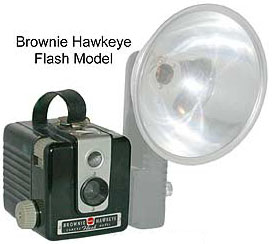
The Brownie Hawkeye Camera
I had an up-and-back meeting in Pittsburgh last week. All of the development is on the South Side these days and many companies have their headquarters there, as does the National Energy Technology Laboratory. On the way home from my meeting, I noticed a Thrift Store -- and I cannot resist streamlined diners or Thrift Stores. There was a time when I could go into a Pittsburgh Thrift Store and come out with a bagful of Bowling Shirts. Alas, e-bay has put an end to that, but I did see a Brownie Hawkeye camera that was a dead ringer for the one that I had when I was a kid. So, $3.95 later, I made another detour to Beto's Pizza on Banksville Road Road. This is the last of the no-frills places that makes pizza in big 2'x3' sheets and sells it in slices. While I was eating, I examined the camera more closely, and what did I see, but a FILM NUMBER in the little red window on the back -- the camera was set to take exposure # 10. I gingerly protected the thing through airport security -- fortunately there wasn't much of a line and the TSA person was helpful. When I got home, I took the thing to a professional photographer. He was able to make some color prints from the film! Of all things, someone went out to take pictures of Streetcars, probably before 1957. For some reason, the images waited 50 years for me to find them. Unfortunately, the quality of the photos after all that time rendered them unusable. Still, the photos called back a lot of memories from my childhood when the streetcar was the only way to get around. So, I went snooping around the internet to find photos that I could use to tell a story. Apparently, there are lots of folks who are interested in Pittsburgh Streetcars and there is no dearth of images available. The very best is the Frank Fairbanks Collection at the University of Pittsburgh. The images are mostly of parts of the Pittsburgh Railways system in the South Hills part of the city (one notable exception), so that's consistent with finding the camera in the South Hills.
ABOUT THE STREETCARS
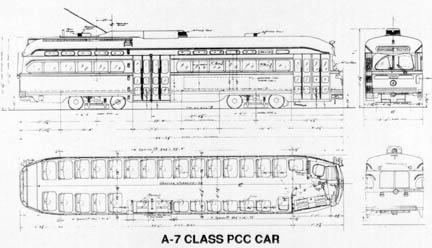

The PCC Car
(right) From Popular Mechanics (March, 1937)
Click to enlarge
It turned out that the PCC streetcar was a very good design. The standard car was 46' long and 100" wide with later models 46.5' long and 108" wide. Chicago, Detroit, Illinois Terminal, Pacific Electric, and San Francisco had longer cars, as long as 50.5.' Washington, DC, had shorter cars (44') because of car house clearances. Many railways altered the car in various ways to fit their own needs, but most cars retained a standard appearance.
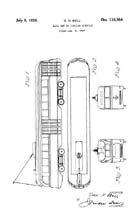
The PCC Car Design Patent
Dan Bell for the Transit Research Corporation, Patent D-110,384
Click to Enlarge
Pittsburgh Railways (PRCo) took delivery of PCC #100 in June 1936, the fourth order for a PCC car but the first PCC car delivered and the first in revenue service in the world. Production continued in North America until the early 1950s, with 4978 units built; thousands more PCCs and direct descendants were produced in Europe through the 20th century. The cars were very sturdy and many lasted a long time; well into the 1970s the majority of surviving North American streetcar systems used PCC cars, the systems which closed often selling their cars secondhand to the surviving operators. A handful still remain in service alongside modern vehicles, though most of the PCC cars functional today are operated by museums and heritage railways.
By the way, if you like the looks of these streetcars, you might want to have a peep at our Streamlined Locomotives Page.
ABOUT THE LOCATIONS
You'll want to use the photo called "Map Aids" to get some general perspective on where the photos were taken.
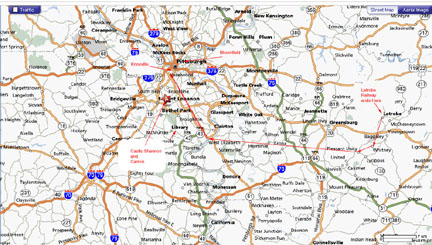
Map Aids (click to enlarge)
This photo was taken in the Borough of Castle Shannon, just south of Mount Lebanon, a ritzy suburb. The end of this line was a small town called "Library", a memorial to Andrew Carnegie's penchant for endowing Libraries. (The area ZIP 15129, is now known as "South park Township") The photo shows a standard red PCC car from the "Modern" period lines. This is an Art Deco treasure, and I loved them.
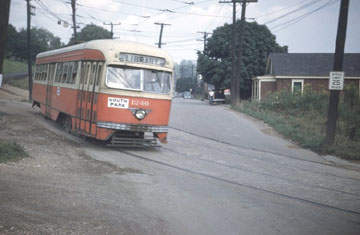
PCC Car on the Castle Shannon Line
On the Way to Library, Pa. (15129)
Click to Enlarge
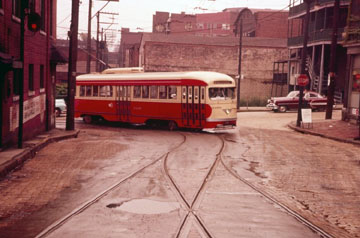
Making a Tight Curve in Carrick, Pa.
Click to Enlarge
This is the South Hills Junction Tunnel. This picture was taken as the car was emerging from the tunnel under Mount Washington, coming FROM the city. Many people call this "Trolley Heaven" because so many cars pass by.
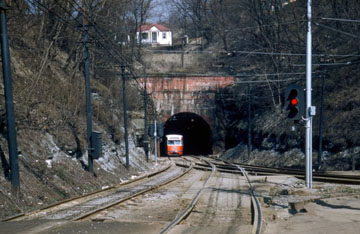
Emerging From the South Hills Tunnel into Trolley Heaven
Click to Enlarge
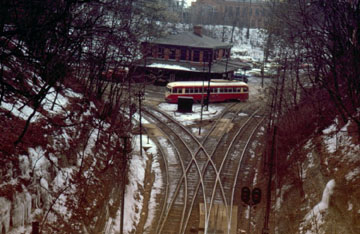
The South Hills Junction Station
The Hot Dogs Were Heavenly in Trolley Heaven
Click to Enlarge
West Penn Railway System was an inter-urban line that linked Pittsburgh with the Laurel Highlands. It was owned and operated by the Mellon Family, and it closed in 1952. Note that they did not spend a lot of money on rolling stock. (Although "Rolling Rock" beer used to be brewed in Latrobe... Back in those days, the scenery turned into farmland pretty much after you left Mount Lebanon. There are plans in the works to resuscitate this route, linking Latrobe with Pittsburgh via Greensburg.
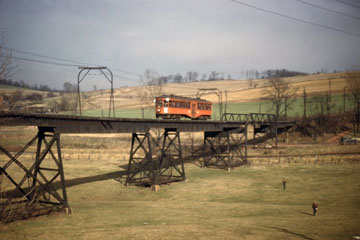
West Penn Interurban Line
Nothing but McMansions there now...
Click to Enlarge
This is a close-up of the interurban car. It would take you to the Junction where you could transfer to the city lines.
Closeup of an Interurban Car
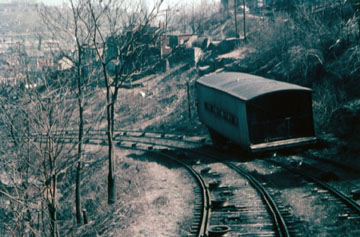
The Knoxville Incline
Last: My Favorite!
This is the 77/54 that ran from Carrick, through Center City ("Downtown") to Homewood, passing through Bloomfield, where I grew up. Everyone called it "The Flying Fraction" reportedly named by the late Rege Cordic. The Flying Fraction would also be memorialized by no less than sportswriter Frank Deford in this essay on Pittsburgh boxer Billy "The Pittsburgh Kid" Conn in: The Boxer and the Blonde. Mentioned in that essay is how Conn "loafs with" legendary Pittsburgh streetfighter Joey Diven who once took on the entire Pitt Football team,. I think that this picture was taken outside the old Duquesne Gardens where the hockey team used to play. This may have been the Hornets, the precursor to the Penguins. What a thrill!! I rode all these trains and wish that they were back!
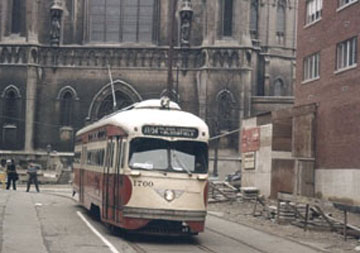
The Flying Fraction
Click to Enlarge
The 77/54 ran from the Brentwood loop in Bentwood just outside the City limits, all the way down Brownsville Road to South 18th street in Mt.Oliver, down south 18th street to East Carson Street on da Soutí Side where it turned right, ran across East Carson Street to Brady Street just beyond 22nd Street where it turned left and travelled across the Brady Street Bridge to Forbes Avenue, where it turned right and followed Forbes past the Craft Avenue carhouse, past Forbes Field and the Carnegie library in Oakland, turned left on Craig, ran up Craig across Highland and past St. Paulís cathedral, to Centre Avenue, where it turned right, ran down Centre Avenue to Millville Ave. It turned left on Millvale Avenue and ran along Millville to Liberty Avenue, where it turned left on Liberty Avenue, ran across Liberty Avenue and continued straight ahead on Main Street where Liberty Avenue (and the #87 Ardmore car line) veered left across Main the short distance to Penn Avenue, then left on Penn Avenue and down Penn Avenue to the point where Butler Street began (or ended) (and where I disembarked to transfer to the #94 Sharpsburg car) thence down Penn Avenue almost into downtown, but turning right at 16th street to cross the 16th street bridge into the North Side, turning left on East Ohio Street, and then across East Ohio to Federal Street, where it turned left and ran toward downtown and the 6th street bridge, but turning left just short of that on, I believe, Reedsdale and over Reedsdale to 7th street where it turned right again on 7th, and then right on Robinson over which it ran back to 6th street where it turned right and headed north back to Federal Street and repeating the same route back to Carrick and Brentwood.
Home | About Lindy | 1940s Collectibles | Upcoming Events | Vintage Clothing
The Guide - Establishments - Travel - Accessories
Music | Links | Photo Gallery | Extras | Contact